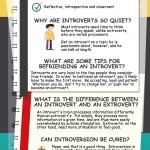By now, most of us are familiar with the typical introvert traits. Introverts are likely to spend more time thinking than talking. We avoid crowds and seek quiet. At times we zone out when we are tired or in a large group. These are all common introvert behaviors. The question is, what causes introverts to behave in a certain way? More specifically, how does introvert biology differ from extrovert biology?
To answer that, we should first discuss whether or not introversion is a product of nature or nurture.
Nature vs. nurture
A study by American psychologist, Jerome Kagan, linked introversion to high reactivity in infancy. Four-month old babies were subjected to various forms of stimuli, including new sounds, faces and objects. Babies who reacted dramatically to the new stimuli (crying, thrashing limbs, etc.) were defined as ‘high reactive’.
High reactive babies were found to have over-active amygdalas. The amygdala is the emotional center where the brain triggers the adrenalin response to danger. Put simply, the high reactive infants were easily over-stimulated. They later became quiet, careful teenagers – introverts.
Kagan’s study shows that introversion is present from infancy. It also suggests that the nervous system shapes personality. Other studies of identical twins provide further evidence that introversion has a biological and genetic basis.
The introvert brain
Now that we’ve tackled the nature vs. nurture question, lets take a closer look at the biology of introversion. In her book, The Introvert Advantage: Making the Most of Your Inner Strengths, Marti Olsen Laney talks a lot about an introvert’s nervous system.
Olsen explains that introvert traits, such as talking more slowly and showing less facial expression, can be linked to biology. She highlights research that shows that introverts have more blood flow to the brain than extroverts. The blood also flowed along different pathways for introverts and extroverts.
“The introverts’ blood flowed to the parts of the brain involved with internal experiences like remembering, solving problems, and planning. This pathway is long and complex. The introverts were attending to their internal thoughts and feelings.” – Marti Olsen Laney, The Introvert Advantage
The same study showed that an extrovert’s main blood pathway to the brain is short and less complex. Extroverts paid more attention to what was happening around them in the lab.
This doesn’t mean that either personality type is more intelligent. It does, however, suggest that introverts and extroverts process and retrieve information differently.
Introverts and dopamine
Another key difference between an introvert and extrovert’s brain has to do with dopamine. Dopamine is a chemical that influences responses to reward and novelty. Introverts need less dopamine to feel good. Too much outside stimulation can cause an introvert’s brain to be flooded with an excess of the chemical.
Extroverts are less sensitive to dopamine. They need more of the feel-good chemical to get the buzz associated with happiness. This causes them to seek more external stimuli and rewards.
Other physiological manifestation of introversion:
- Lower blood pressure
- Greater sensitivity to caffeine
- Tendency to salivate more easily
- Sweat more in reaction to pain, smell and taste
All of this tells us that there is a biological basis for introvert behavior. When an introvert ‘zones out’, he is actually protecting himself from overstimulation. Being alone is a way of regulating dopamine levels. An introvert’s internal focus can be linked to blood pathways in the brain.
What I hope people take away from this information is that introversion is a core personality trait that can’t be fixed or outgrown. Rather than trying to change us, society should recognize our innate strengths and gifts.












AnsumanYou’re very welcome 🙂
Its a blessing to have finally found this website and to read these articles and say “hey thats me 100%” “maybe im not just a weird quiet animal lover who feels more comfterable with my 2 dogs or any animals than with people” and it feels good to know there are more people out there like me than i originally thought and nothing is wrong with me its just a introvert personality…. I feel emotionally drained when i have to socialize all day and i feel like i have to be constantly turned “on” like participating, making small talk , trying to engage in conversations but trying not to reveal much about myself because im super guarded about who i let close to me…..i even prefer to be alone in my room than engaging in activities with my family…. Im not a mean person i actually am a very caring person and generally want to help people and animals and i will conversate for hours via text message or letters but i strongly dislike phone calls and talking face to face just trying to maintain the right amount of eye contact (not to much and not too little) is nerve wrecking for me during conversations. I have always felt like being an introvert was something i had to fix and i have been criticized harshly for it most of my life ( I was kicked out of nursing school even though my grades were straight A’s and i was the perfect student because the teachers said i was’nt sociable enough to be a nurse and i needed to make more friends and socialize) which was heart breaking for me because even though i am quiet and making friends is hard for me i generally do care alot about people and once someone is my friend i would do anything for them and try and make them happy.
Very interesting point : ” An introvert’s internal focus can be linked to blood pathways in the brain”…
I express myself more with Book than Verbally..meaning, I write more than I speak..
I think I need help. My teenager is constatnly hugging me or laying on me and just in general invading my space. He thinks it is funny and is a game when I tell him I need him to stop. He pushes me and pushes me until I have no choice but shove, push, or scream at him to leave me alone. I can’t seem to get him to understand that I love him but I just cannot handle the constant talking, picking and invasion of my personal space. I can’t take a bath or go in my room without him thinking he has to come talk to me or hug on me. He is always asking me why I hate him or why I don’t love him and he thinks its a big joke, but I feel like I’m going to crack because I feel so guilty. I feel like I am a horrible mother, but if there were levels of being introvert I would of the chart. What Do I Do?
I am not speaking professionally, but from my own experience. My mother was the same as you and I married a woman just like her. Twenty five years together with my wife and I still feel like she could walk away without much thought. Like myself, he probably feels like there is something wrong with him. That he doesn’t deserve to be loved. That he is lacking something, but doesn’t know what. So he is constantly trying to show you that he loves you. When that effort annoys you or aggravates you, we try to roll it off as trying to be funny or something. It is much more problematic to us than it is to you, I would think.
Here are some of my thoughts. Compliment him when he achieves things and tell him you are proud of him. Tell other people that you are proud of him. Make an effort to reach out to him and pat him on the back (physically). Never fake it, he will know. If you compliment other kids in his presence, it will feel to him like he doesn’t measure up. And never, like my Mom, ask him what she did wrong in raising him. That last comment may make you think I was a problem child or citizen, but I am not. I was in National Honors Society in high school and dropped out of college to start my own business when I was 19 1/2 years old. I have been in business for over 26 years now and I am considered the top of my field in my area. My two kids were in honors classes in high school and are in college now. My mothers comment about what she did wrong with me was just 2 years ago.
My point is suck it up and make sure you don’t cause your son unnecessary problems throughout life. I don’t think I will ever be appreciated or completely loved because I just don’t know how. But I do dream of what that would feel like. You chose to bring this child into this world. Even if it overwhelms you, make him feel loved and wanted.
Your son may also be displaying unhealthy levels of attachment, especially for his age. I would seem gentle, intuitive and professional help so as to hopefully help him through possible dependencies and build healthy ways for you and him to both express your emotions and love for each other.
When I zone out, my friend always asks me what’s wrong? I don’t know how to explain it to him. I don’t know exactly what is going on….
Thank you for the interesting article. I have always considered myself an introvert, but funny enough this is not how or why I was directed to this page. At a recent annual check-up, the doctor observed that I had low blood pressure, both systolic and diastolic. As long as I can recall, my blood pressure has always hovered around mid 90/mid 60-70. My mom also has low blood pressure all her life. The doctor told me that low blood pressure, especially the diastolic is bad for the heart. This got me worried. So I decided to look up info on low blood pressure on the web. I saw on a website that stated “Acetylcholine dilates blood vessels and will lower pressure.” I was like, wow, I read somewhere that introverts’ preferred neurotransmitter is acetylcholine, instead of dopamine for extroverts. So I thought to myself, wow, interesting so maybe my low life-long, genetic low blood pressure may be related to my introversion?! The info on this page appears to confirm this point. Could someone direct me to more research resources on this topic? Thanks!
Asking questions are in fact good thing if you are not understanding anything entirely,
but this piece of writing presents nice understanding
even.
I really dislike how current psychology puts introversion within the Autism Spectrum Disorder(ASD).
As an introvert you are (likely):
-Sensitive to stimili
-More sentitive to emotions of others
-shy or even social anxiety
-eye for detail(photgraphy/painting as hobby etc)
Yet these are also markers for autisme nowaday, and you dont have to score many markers of the autism spectrum to get such a diagnose.